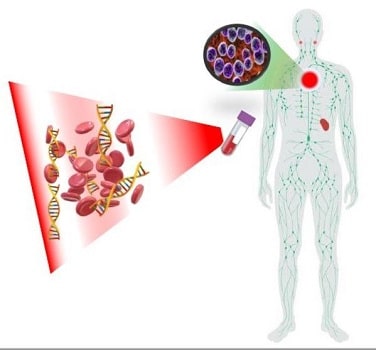
Visits: 0
– The blood test developed at the Hebrew University detects immune and inflammatory activity in tissues, eliminating the need for painful biopsies and expensive imaging
Courtesy Hebrew University: The immune system works hard to keep us healthy and protect us from bacteria, viruses, fungi, parasites, and cancer cells. When our immune system is weakened, we run the risk of contracting dangerous diseases and infections; when they are hyperactive, we are at risk for inflammation and autoimmune diseases. Therefore, accurate monitoring of the activity of our immune system is vital to our health. Here is the importance of liquid biopsy.
Currently, the main way to test the health of our immune system is a blood test that counts the immune cells (white blood) in the body. If the number comes out higher than normal, it could mean that there is an infection in the body that the immune system is fighting.
However, these blood tests often fail to detect immune system activity in remote tissues in the body, such as those found in bone marrow, lymph nodes, and other organs. In these cases, patients should be followed up with invasive measures such as biopsies and costly and potentially harmful imaging modalities such as PET/CT and MRI. And yet, these advanced tests don’t always catch the problem.
Now, a group of scientists, led by MD/PhD student Ilana Fox-Fisher of the Hebrew University of Jerusalem (HU) and Professor Yuval Dor of the Israel Medical Research Institute in Canada (IMRIC), has developed a new method to monitor remote immunological processes within these remote tissues and organs.
The work, recently published in eLife, is based on two fundamental biological principles. First, dead cells release DNA fragments into the bloodstream. Second, the DNA of each cell type contains a unique chemical pattern called methylation.
Based on these principles, scientists can identify which tissue circulating DNA fragments originated and infer disease states. For example, if a patient is battling breast cancer, there will be an elevation of DNA fragments (which are deposited in the bloodstream after a cell dies) originating from the breast cells and carrying the methylation marks of the breast cells. breast, ditto for cardiac DNA fragments during heart attacks. “These methylation markers allow us to monitor the dynamics of human immune cells and provide important information that is not accessible in standard blood cell counts,” explained Dor. “This new tool can illuminate healthy and pathological immune processes that occur deep in tissues that are not currently accessible,” he added.
As part of their work, the researchers identified specific DNA methylation patterns between immune and inflammatory cell types. This helped them detect DNA fragments that were deposited in the bloodstream when these immune cells died.
“An important finding is that the DNA fragments derived from the immune system are not simply a reflection of circulating blood cells, but rather an accurate report of the immune processes going on in the body,” explained Fox-Fisher.
“Our research suggests that, in principle, clinicians could monitor remote but critical immune processes, measuring victims of the immune battle, meaning immune-derived DNA fragments circulating in patients’ blood.”
The researchers tested their theory and found proof of concept by testing several medical conditions in which the immune system is activated but standard blood cell counts are normal.
The first was eosinophilic esophagitis (EoE), a chronic allergic disease that affects children and adults and is often difficult to diagnose. To date, EoE diagnoses require invasive endoscopic biopsies because most patients’ blood counts return to normal.
However, on further investigation, Dor’s team found that the blood of EoE patients contains abnormally high levels of eosinophil DNA fragments (as identified by their unique pattern of DNA methylation). “Our new non-invasive blood test can be of great help in diagnosing and monitoring this disease,” added Fox-Fisher.
The team found similar success with lymphoma, a type of cancer that usually doesn’t show up on blood tests. However, the new blood test collects DNA fragments left over from the immune system’s fight against lymphoma, without the need for bone marrow aspiration and other images.
Fox-Fisher is currently conducting a study with people who were vaccinated against COVID-19 to see if the levels of DNA released by antibody-producing B cells increased after they received the vaccine.
“We are hopeful that this new blood test will give clinicians a more accurate picture of their patients’ health status beyond standard blood counts that often don’t tell the whole story and often require invasive follow-up tests and biopsies,” Fox concluded. -Fisher.
Source:. Hebrew University of Jerusalem DOI 10.7554 / eLife.70520
Related article: Biomarker anticipates severe strokes in patients with COVID-19
Leave a Reply